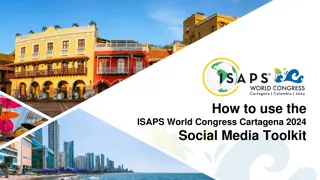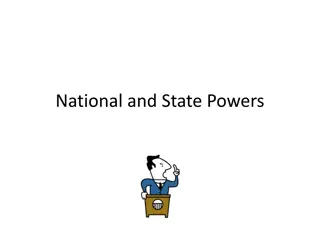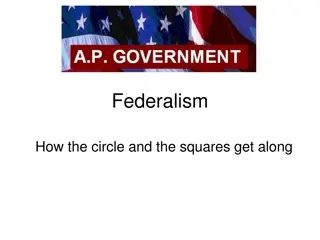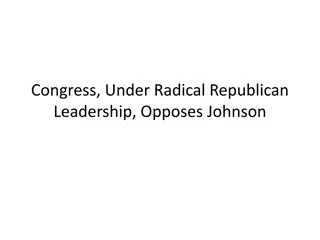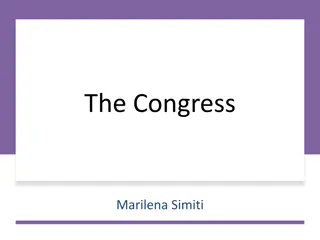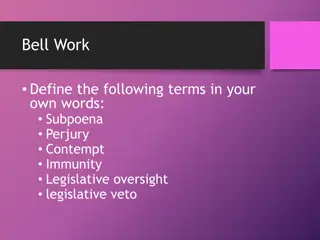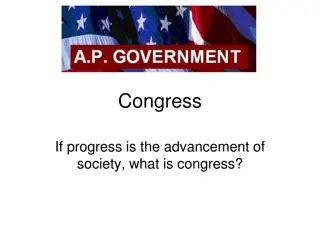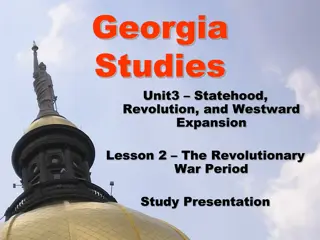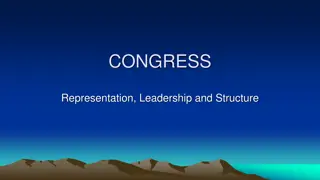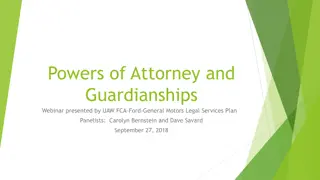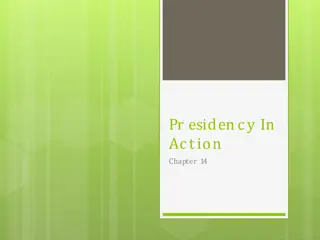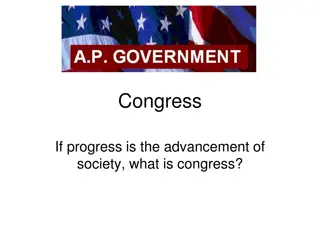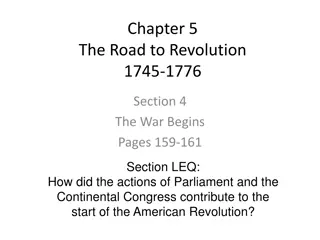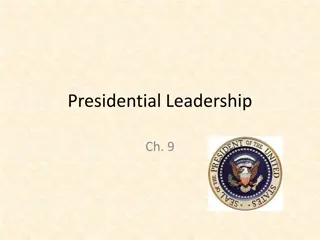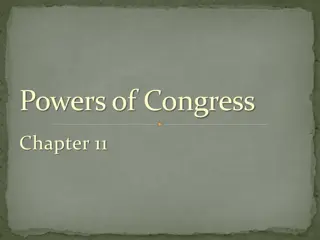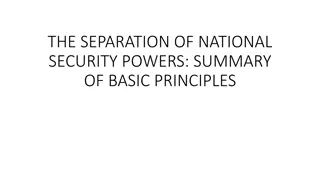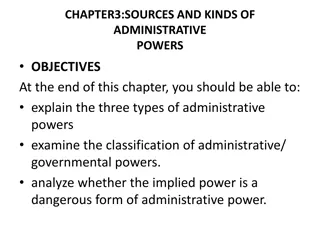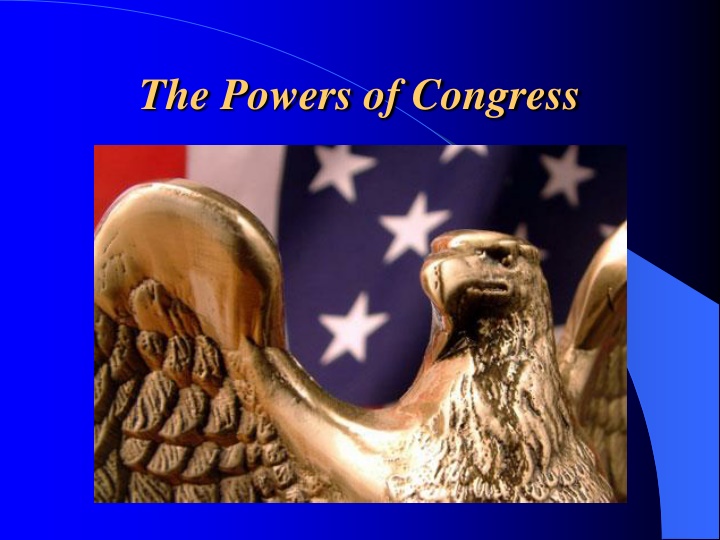
Powers of Congress in the US Constitution
Explore the enumerated, implied, and other powers of Congress as outlined in the US Constitution, including examples of legislative authority, implied powers, and concurrent powers shared with the states. Learn about the scope of congressional powers, from regulating commerce to governing federal properties.
Download Presentation

Please find below an Image/Link to download the presentation.
The content on the website is provided AS IS for your information and personal use only. It may not be sold, licensed, or shared on other websites without obtaining consent from the author. If you encounter any issues during the download, it is possible that the publisher has removed the file from their server.
You are allowed to download the files provided on this website for personal or commercial use, subject to the condition that they are used lawfully. All files are the property of their respective owners.
The content on the website is provided AS IS for your information and personal use only. It may not be sold, licensed, or shared on other websites without obtaining consent from the author.
E N D
Presentation Transcript
Legislative Powers Enumerated/Delegated (Expressed) powers are specifically given to Congress in the Constitution. Article 1, Section 8 of the Constitution spells out the major powers of the Congress. The first 17 clauses list specific powers granted to Congress. (textbook pages 59 60 take a minute and read over them)
Enumerated/Delegated/ Expressed Powers Examples of Enumerated/Delegated Powers are: Raising & supporting an army and a navy Establish uniform rules of naturalization (also called naturalization laws ) Print & coin money Establish post offices Declare War
Legislative Powers Implied powers are not specifically listed for Congress but are understood according to Article 1, Section 8, Clause 18. (look at page 60) This is often called the elastic clause because it gives Congress authority to stretch its power and do whatever is necessary and proper to do their job & carry out their listed powers
Implied Powers Examples of Implied Powers (from the Necessary and Proper Clause) are: To raise and support an army implies Congress can implement a draft Collecting taxes implies that Congress could use the money to support programs Establishing naturalization rules implies that Congress can limit the number of immigrants.
Other Powers Concurrent Powers are those that the Federal Government and the States Share !!! Building Roads Establishing Courts Collecting Taxes Law Enforcement Prisons Reserved Powers Those held only by the States!!! 10th Amendment
Congressional Powers Most congressional power is related to making laws for the nation. However, Congress has many other powers as well: Regulating interstate (between states) commerce (business) Raising and spending money Creating federal courts Dealing with foreign countries Governing all federal property (military bases, national parks)
Congress & Funding To fund the U.S. Government, Congress has the power to levy taxes. All tax bills are proposed or start in the House of Representatives and must be approved by the Senate. Why do you think they start in the House?
Congress & Trade Article 1, Section 8, Clause 3 , also called the Commerce Clause is the basis for many of Congress most important powers this allows Congress the power to regulate foreign and domestic trade. Domestic - interstate
Congress & Trade Examples of powers from this clause: Air Traffic Railroads Trucking Radio / TV Pollution Stock Market
Congress & Foreign Relations While the President has the authority to negotiate treaties and deal with other nations, all treaties must be approved by the Senate. This is an example of a _____ and _____?
Congress & Foreign Relations While the President has the authority send troops into combat for up to 60 days, only Congress has the power to declare war or create an army. World War II was the last declared war in the U.S. (1941-1945)
Non-Legislative Powers Non-Legislative Powers are powers that Congress has the does not relate to passing laws. Examples: 1. Proposing Amendments 2. Approvals of Nominations (Senate) 3. Removal from Office and Impeachments 4. Investigations
Non-Legislative Powers Check and Balance --- The Senate can approve or reject presidential nominees or appointments for various offices. Check and Balance - Congress can also remove any elected officials from office in cases of wrong-doing.
Impeachment Impeach means to formally accusing officials of misconduct or wrong-doing. Impeachments are usually handled by a trial. The House always begin impeachment procedures. If the majority of the House votes for impeachment, it moves to the Senate. The Senate acts as jury, while the Chief Justice of the Supreme Court acts as judge. 2/3 needed for guilt to be found in the impeachment (67 Senators)
Impeachment Only two presidents have ever been impeached (neither removed from office). Andrew Johnson (1868) and Bill Clinton (1998)
Non-Legislative Powers Congress also conduct investigations into serious issues. Organized crime, fund raising, Watergate, Iran- Contra, etc.
Limits to Congressional Power The Constitution limits the power of Congress, placing restrictions on their power. Congress may not favor one state over another, tax exports, tax interstate trade.
Ways that Congressional Power is Limited The Constitution also reserves many powers to the states and other branches (10thAmendment) Congress can not interfere with these Reserved powers. The Supreme Court can declare laws unconstitutional and the President can veto laws.
Limits to Congressional Power Congress can not pass bills of attainder (laws that punish a person without a jury trial)
Limits to Congressional Power Congress can not suspend the writ of habeas corpus (court order requiring police to bring a prisoner to court to explain why they are holding that person).
Limits to Congressional Power Congress can not pass ex post facto laws (or laws that make an act a crime AFTER it has been committed)

